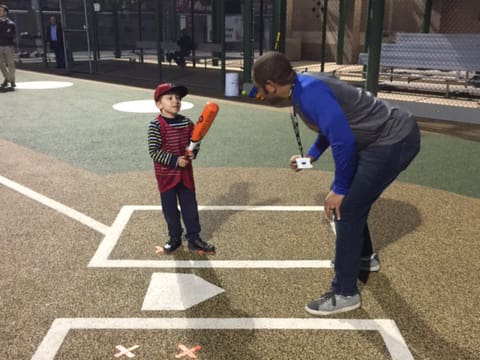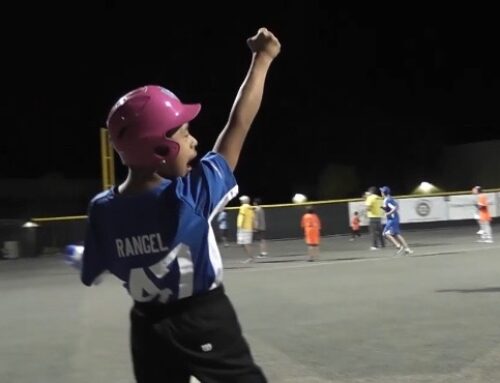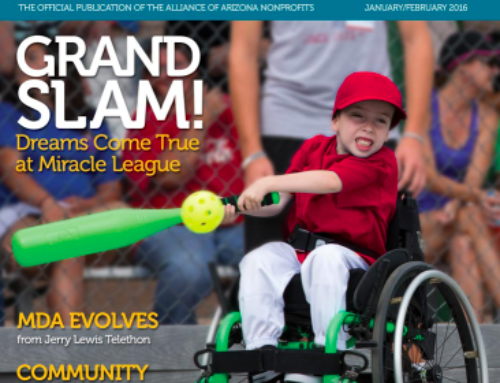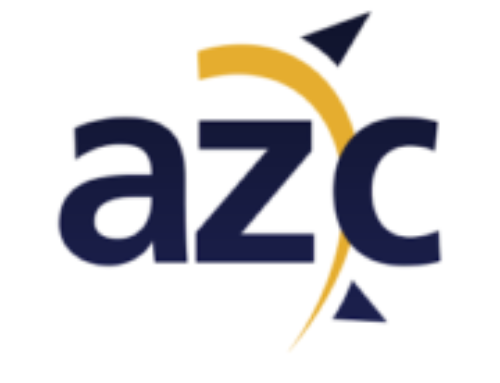By Phil Latzman
Many developmentally disabled and handicapped children find themselves on the outside looking in when it comes to playing sports.  That’s not the case at one special Valley sports facility that’s creating miracles for kids who have no other way to play the national pastime.
The Miracle League of Arizona is a specialized stadium that houses Scottsdale’s own field of dreams. On a chilly Friday night in January, there’s a glorious desert sunset and the McDowell Mountains in the background. Children are scurrying around excitedly, doing something they normally can’t do.  Cindy Strasser watches her tall 9-year-old son Jacob excitedly swing the bat. He seems like any other kid his age, but he’s not.  “Jacob has autism. He does look typical, except for when he doesn’t.†Strasser said.  “He has a lot of energy. You can bottle it up and we can power 10 adults off the energy he has.  Jacob’s condition makes it hard for him to play with other kids. But here at the Miracle League, he fits right in with other children who don’t.
The inspiration and vision for the stadium came from late baseball Hall of Fame member Harmon Killebrew, who once lived nearby.  In 2008, the Scottsdale Unified School District donated the land and that vision was carried out by recently retired major league pitcher Danny Haren and his father Dan Senior.  Cassandra Switalski is the Arizona league’s director of operations.  “It’s for individuals who have any kind of disability or health impairment. Basically, they come on and they get to play baseball, they get paired up with a one-on-one helper, encourager and friend.†Switalski said.  “Everyone gets to play; everyone gets to experience success, and everyone has good time.â€
Switalski and her crew make sure of that by constantly chaperoning and cheering on the players, ranging in age from 4 all the way up to adults. She says it’s all close to her heart growing up in a family with disabled siblings.  “For me, it’s very rewarding and it’s very personal. I actually have two brothers that are athletes and participants,†she said. “The smiles on their faces when they come across home plate that makes it all worth it.â€
The baseball outlet is not only good for the kids, but also for parents like Tara and Todd Boedigheimer, who are watching their 7-year-old son Drew, who had a heart transplant when he was just 2. Then, he had a stroke five days later. In addition to that, he’s has an underlying neuromuscular disorder which makes it painful and difficult to move.  “That’s what makes this place so special is that he’s able to play baseball.†Todd Boedigheimer said.  He’s never been able to run or jump, and this a place where that really doesn’t matter.† Playing baseball just like other kids, is the highlight of Drew’s week.  “It’s good, and it just makes you think about everything. It just feels good to do the thing you love,†Drew said.  Tara Boedigheimer knows how important this night is to her son.  “(It) gives him a chance to be normal and do all the things that other kids do, and just to have fun for an hour, and forget that he has challenges.â€
It gives parents the chance to do the same. Melissa Klepacki’s 9-year-old son Marcus has also had a very difficult young life.  “He was born with a missing right limb, and then a missing left thumb. He also can’t bend his elbow, he has severe scoliosis and is in treatment for leukemia.† But none of that seems to faze Marcus, who bats and throws with his left arm only.  “I know how to do many, many things just with one arm. Swing a bat for example.†He said proudly. “I can swim with one arm. I can play video games with one armâ€.  Melissa said it gives her amiable and enthusiastic son a bit of freedom.  “He doesn’t have to worry about anyone, or for anyone to judge him, or judge us, or look at us differently. He’s a just a normal kid out here.† A normal confident kid that’s just having a blast.  “I know I’m going to do well. It’s just always fun here and I know I’m going to have a good time.â€
There are 260 such leagues around the country, but none quite like the Scottsdale facility, which relies on donations and grants and just spent $118,000 on renovations, including a new rubberized playing surface. The funding came from a grant from Arizona’s Sports and Tourism Authority.
The Miracle League is open to anyone at any age with any disability. More information on how to participate or donate is at miracleleagueaz.com.







